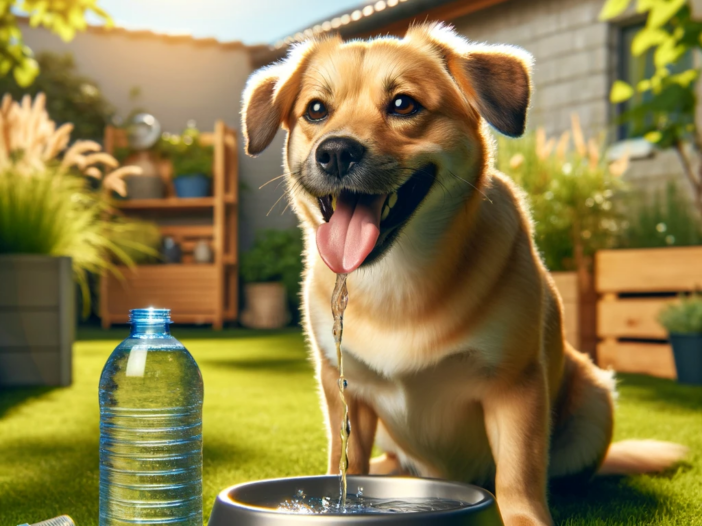
This post may contain affiliate links. We are compensated for referring customers to our affiliate partners.
Hydration in dogs is much more than just quenching thirst; it is a crucial aspect of their physiological functioning. Every cell, tissue, and organ in a dog’s body requires water to function effectively. Water helps regulate body temperature, especially important for dogs as they are more susceptible to heat stress. It facilitates digestion, allowing nutrients to be absorbed and waste to be expelled efficiently. Additionally, proper hydration is key to maintaining healthy skin and a lustrous coat. It also plays a pivotal role in preventing health issues like urinary tract infections and the formation of kidney stones.
The Benefits of Water-Rich Diets in Canine Nutrition
A water-rich diet can significantly benefit dogs, particularly those that are prone to dehydration or have specific health issues. Such diets generally include a higher proportion of wet foods, which are typically made up of 70-80% water. This significantly higher water content compared to dry kibble (which usually contains about 10% water) helps maintain hydration and is easier on the kidneys and urinary tract.
Incorporating broths or water supplements into a dog’s diet can also be beneficial. For instance, bone broth is not only hydrating but also provides essential nutrients like minerals and collagen, which support joint health. Hydrating supplements often contain electrolytes, which can be especially beneficial for active dogs who lose more minerals through sweat and panting.
Determining a Dog’s Hydration Needs
The amount of water a dog needs can vary significantly based on several factors. Size is a primary factor – larger dogs will naturally require more water than smaller dogs. Similarly, a dog’s breed can influence its water needs; breeds with thicker coats may need more water, especially in warmer climates, to help regulate their body temperature.
Age is another crucial factor. Puppies, who are more active and have developing bodies, might require more water, whereas senior dogs, who are generally less active, may need less. However, older dogs may also have underlying health issues that affect their hydration needs.
The dog’s environment and lifestyle also play a role. Dogs in hotter climates or those that are very active will require more water to stay hydrated. Conversely, dogs in colder climates or with a sedentary lifestyle may need less.
Recognizing and Addressing Dehydration in Dogs
Dehydration in dogs can be a serious health concern. Symptoms of dehydration include lethargy, dry gums, excessive panting, sunken eyes, and a loss of elasticity in the skin. In severe cases, dehydration can lead to kidney failure or other critical conditions.
To prevent dehydration, it’s essential to provide constant access to clean, fresh water. For dogs that are less inclined to drink, encouraging water intake is crucial. This can be done by adding flavor to the water with a bit of chicken broth or by using water fountains that provide a constant stream of fresh water, which can be more appealing to dogs.
The Role of Veterinarians in Canine Hydration
Veterinarians play a critical role in managing a dog’s hydration, especially for dogs with health issues that affect their water intake or hydration status. Regular veterinary check-ups can help monitor a dog’s hydration and kidney function. Vets can also provide tailored advice on the dog’s diet and water intake based on their specific needs and health status.
For dogs with certain health conditions, such as kidney disease or urinary tract issues, vets might recommend specific hydration strategies or prescribe special diets. These diets are formulated to support hydration and reduce the strain on the kidneys, aiding in both the prevention and management of related health issues.
Integrating Hydration into Daily Canine Care
Integrating hydration into a dog’s daily routine involves more than just providing water. It’s about creating an environment and establishing habits that encourage regular water intake. Here are some strategies:
- Multiple Water Stations: Place water bowls in various locations around the house and outside if you have a yard. This ensures that your dog has access to water no matter where they are.
- Quality of Water: Ensure that the water is fresh and clean. Changing the water regularly and cleaning the bowls to prevent the growth of bacteria are key practices.
- Hydration Through Food: Consider feeding your dog wet food or a combination of wet and dry food. You can also add water or low-sodium broth to dry food to increase its water content.
- Monitoring Water Intake: Pay attention to how much your dog drinks. Sudden changes in drinking habits can be an indicator of health issues and should prompt a consultation with a veterinarian.
- Encouraging Drinking: Some dogs may need encouragement to drink. Toys that dispense water or creating ice cubes from flavored broth can be a fun way to increase their water intake.
- Hydration for Active Dogs: If your dog is highly active or participates in sports, they will have higher hydration needs. Always carry water during walks or hikes, and consider using portable dog water bottles or collapsible bowls for convenience.
- Adjusting for Weather and Climate: Be mindful of the weather and adjust your dog’s water availability accordingly. Dogs need more water in hot weather and after exercise.
Emphasizing Hydration in Canine Well-being
Hydration is a fundamental aspect of canine health that goes beyond just satisfying thirst. It is about ensuring that dogs have the necessary water intake to support their physiological functions and prevent health issues. By understanding the hydration needs of dogs based on various factors and incorporating strategies to meet these needs, pet owners can significantly contribute to the health and happiness of their canine companions. Regular veterinary consultations are crucial to tailor hydration needs to each individual dog, especially those with specific health concerns. As research continues to evolve in the field of canine nutrition and health, the emphasis on hydration as a key component of canine well-being becomes ever more apparent, ensuring our pets lead healthy, active lives.
